Related Research Articles

Bruno Walter was a German-born conductor, pianist, and composer. Born in Berlin, he escaped Nazi Germany in 1933, was naturalised as a French citizen in 1938, and settled in the United States in 1939. He worked closely with Gustav Mahler, whose music he helped to establish in the repertory, held major positions with the Leipzig Gewandhaus Orchestra, New York Philharmonic, Concertgebouw Orchestra, Salzburg Festival, Vienna State Opera, Bavarian State Opera, Staatsoper Unter den Linden and Deutsche Oper Berlin, among others, made recordings of historical and artistic significance, and is widely considered to be one of the great conductors of the 20th century.
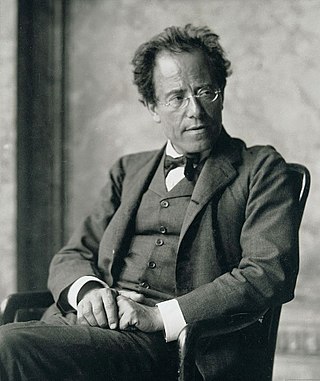
The Symphony No. 7 by Gustav Mahler is a symphony in five movements composed in 1904–05, sometimes referred to by the title Song of the Night, which was not the composer's own designation. Although the symphony is often described as being in the key of E minor, its tonal scheme is more complicated. The symphony's first movement moves from B minor (introduction) to E minor, and the work ends with a rondo finale in C major. Thus, as Dika Newlin has pointed out, "in this symphony Mahler returns to the ideal of 'progressive tonality' which he had abandoned in the Sixth". The complexity of the work's tonal scheme was analysed in terms of "interlocking structures" by Graham George.

Hans Erich Pfitzner was a German composer, conductor and polemicist who was a self-described anti-modernist. His best known work is the post-Romantic opera Palestrina (1917), loosely based on the life of the sixteenth-century composer Giovanni Pierluigi da Palestrina and his Missa Papae Marcelli.
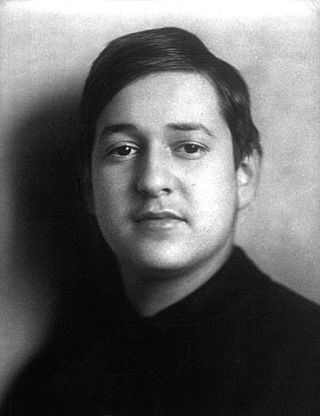
Erich Wolfgang Korngold was an Austrian composer and conductor, who fled Europe in the mid-1930s and later adopted US nationality. A child prodigy, he became one of the most important and influential composers in Hollywood history. He was a noted pianist and composer of classical music, along with music for Hollywood films, and the first composer of international stature to write Hollywood scores.
Des Knaben Wunderhorn is a series of songs with music by Gustav Mahler, set either for voice and piano, or for voice and orchestra, based on texts of German folk poems chosen from a collection of the same name assembled by Achim von Arnim and Clemens Brentano and published by them, in heavily redacted form, between 1805 and 1808.
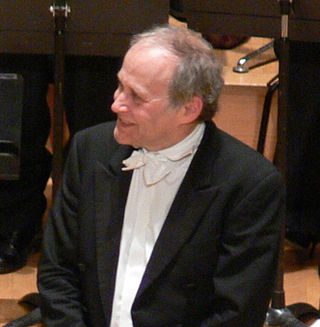
Ádám Fischer is a Hungarian conductor. He is the general music director of the Austro-Hungarian Haydn Orchestra, chief conductor of the Danish Chamber Orchestra, and principal conductor of the Düsseldorf Symphony Orchestra.
Hans Graf is an Austrian conductor.

Gurre-Lieder is a tripartite oratorio followed by a melodramatic epilogue for five vocal soloists, narrator, three choruses, and grand orchestra. The work, which is based on an early song cycle for soprano, tenor and piano, was composed by the then-Austrian composer Arnold Schoenberg from 1900 to 1903. After a break, he resumed orchestration in 1910 and completed it in November 1911. It sets to music the poem cycle Gurresange by the Danish novelist Jens Peter Jacobsen.
This is the discography of Simon Rattle and other produced works by the English conductor.

Alexander Frey, KM, KStJ, is an American symphony orchestra conductor, virtuoso organist, pianist, harpsichordist and composer. Frey is in great demand as one of the world's most versatile conductors, and enjoys success in the concert hall and opera house, and in the music of Broadway and Hollywood. Leonard Bernstein referred to him as "a wonderful spirit".

Dame Sarah Patricia Connolly is an English mezzo-soprano. Although best known for her baroque and classical roles, Connolly has a wide-ranging repertoire which has included works by Wagner as well as various 20th-century composers. She was appointed a Commander of the Order of the British Empire (CBE) in the 2010 New Year Honours and a Dame Commander of the Order of the British Empire (DBE) in the 2017 Birthday Honours for services to music.

Karl Ignaz Weigl was a Jewish Austrian composer and pianist, who later became a naturalized American citizen in 1943.
Harold Byrns was a German-American conductor and orchestrator.
Marc Albrecht is a German conductor resident in The Netherlands. He was chief conductor of the Dutch National Opera, the Netherlands Chamber Orchestra, and the Netherlands Philharmonic Orchestra from 2009 to 2020.
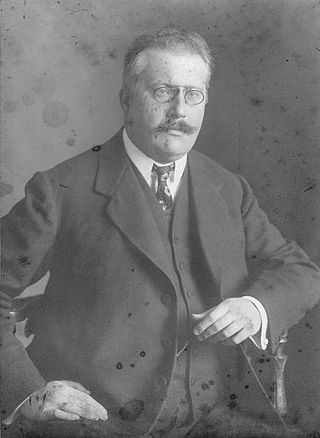
Julius Bittner was an Austrian composer.
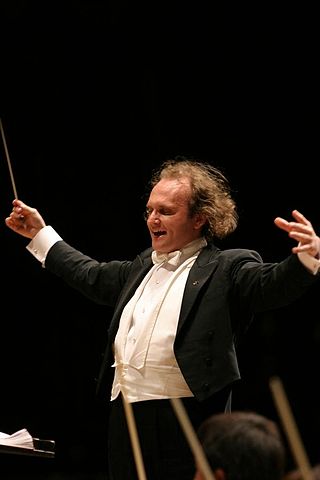
Stefan Anton Reck is a German orchestra conductor and painter. He was born on 26 April 1960 in Baden-Baden, Germany.
The International Classical Music Awards (ICMA) are music awards first awarded 6 April 2011. ICMA replace the Cannes Classical Awards formerly awarded at MIDEM. The jury consists of music critics of magazines Andante, Crescendo, Fono Forum, Gramofon, Kultura, Musica, Musik & Theater, Opera, Pizzicato, Rondo Classic, Scherzo, with radio stations MDR Kultur (Germany), Orpheus Radio 99.2FM (Russia), Radio 100,7 (Luxembourg), the International Music and Media Centre (IMZ) (Austria), website Resmusica.com (France) and radio Classic (Finland).

Alexander Zemlinsky or Alexander von Zemlinsky was an Austrian composer, conductor, and teacher.

Lambertus Reiner "Reinbert" de Leeuw was a Dutch conductor, pianist and composer.
Dietrich Henschel is a German baritone.
References
- ↑ "Holst-Sinfonietta > Willkommen". www.holst-sinfonietta.de. Retrieved 2024-12-27.
- ↑ "Opera Factory Freiburg > Wilkommen". youngoperacompany.de. Retrieved 2024-12-27.
- ↑ Kwon, Junghwan (April 2017). Gustav Mahler's Symphony No. 4 in the Chamber Version by Klaus Simon (DMA). Arizona State University.